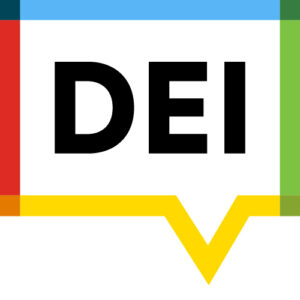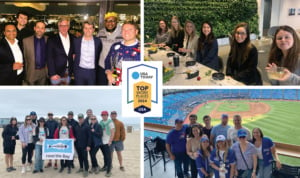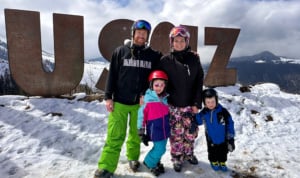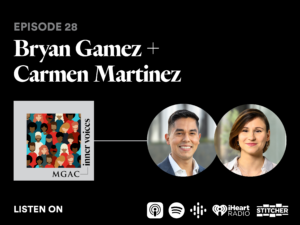MGAC Inner Voices: Episode 0
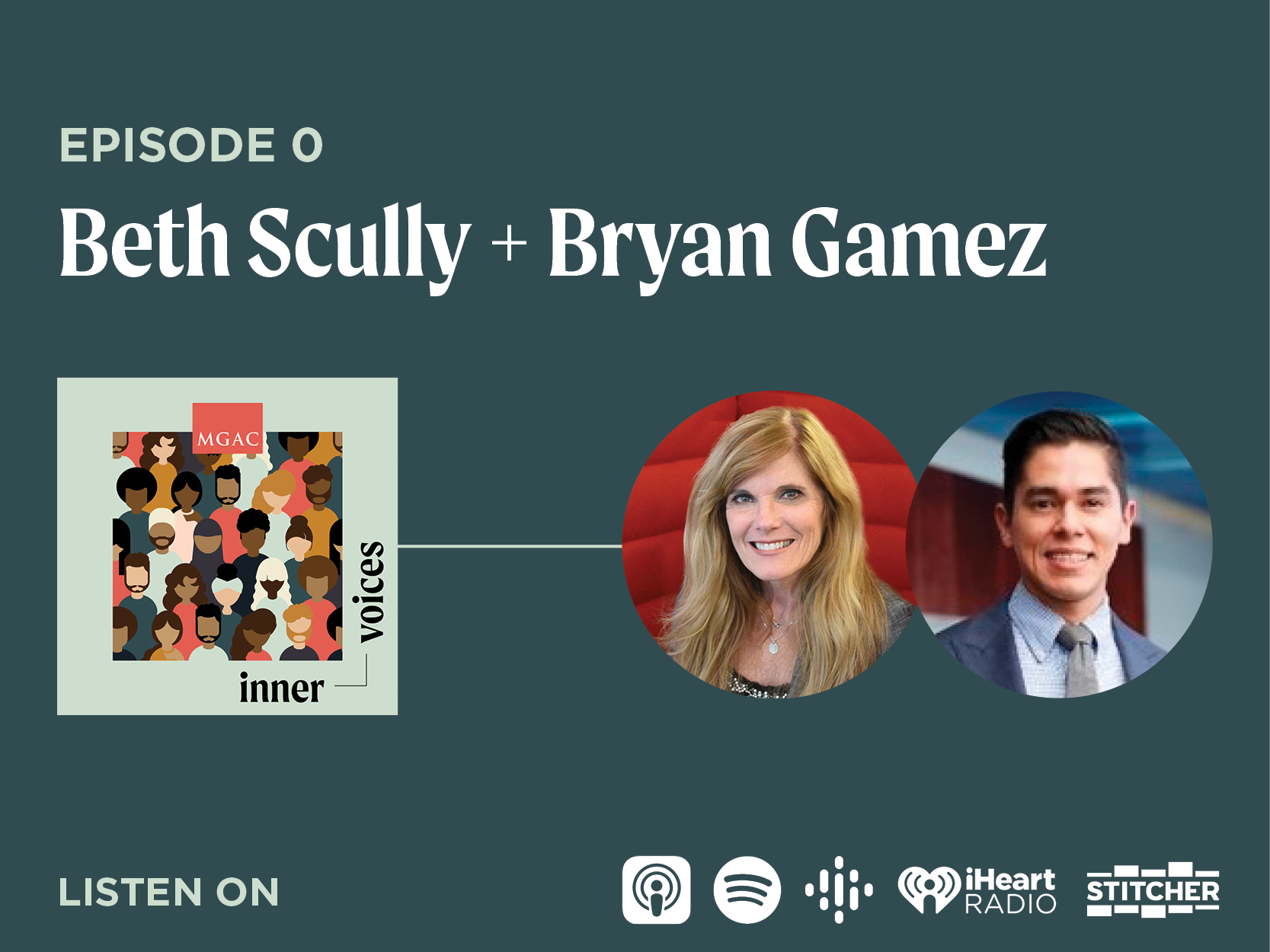
MGAC Inner Voices is an interview format podcast where a diverse mix of employees are interviewed to share their perspective on challenges they have faced in the A/E/C industry as a result of their identity—including race, ethnicity, religion, age, gender, sexuality, ability, etc. By discussing the experiences of our staff, our hope is that their stories will have newfound and powerful resonance with the audience—both to comfort others in similar situations and to encourage those in positions of power to bring about positive, actionable changes to workplace environments for all A/E/C professionals, regardless of their identity.
In our inaugural episode, Beth Scully (MGAC Senior Project Manager, Seattle) sits down with Bryan Gamez (MGAC Assistant Project Manager, Los Angeles) to discuss his experience at the intersection of the LGBTQ+ and Latinx communities within the A/E/C industry.
View Transcript
Transcript
Beth: Hi, and welcome to "MGAC Inner Voices." A podcast digging into issues of diversity, equity, and inclusion in the architecture engineering construction industry. As a disclaimer, we are not experts in all things diversity, equity, and inclusion. We are, however, experts in our own experience. Our hope is that this podcast will create a space to share our stories and discuss how together we can create better outcomes for all of us in the AEC industry and beyond. I'm Beth Scully. I am out in the Pacific Northwest, specifically Seattle, and I'm a Senior Project Manager. It's my great privilege to introduce someone who is becoming a fast friend of mine, Bryan Gamez. Bryan, can you begin for all of our guests by telling a little bit about yourself?
Bryan: First, thank you so much, Beth, for taking the time to interview me. As you said, my name is Bryan Gamez. I am an assistant project manager here at MGAC, and I'm in Los Angeles, California. I've been with MGAC for about a year, and I've been in the AEC industry for approximately five years. I started off as an architect, and then I moved into the GC field. I was a GC for a few years, and now I'm here on the owner's side. My background, I am the gay Latino in this field; I have had the pleasure and the privilege to work with potentially a handful of people who identify with my backgrounds. So, I hope that when I share my story now that I can provide a perspective that others may have never thought of. So, I hope that this brings a fruitful conversation to the table.
Beth: Thanks, Bryan. So, we'll dive right into our questions here. So, specifically, how has your identity as a member of the gay, Latino community affected you in your professional spaces? Can you speak to the challenges you've faced in your career because of your identity?
Bryan: As I've navigated my career, I have never really thought of my identity as something that has prevented me from excelling in the field. But, there have been times where I have realized that I haven't been able to be my 100% true self in the workplace. I think that, especially when I was a GC. There aren't many people that you meet in construction that are gay and Latino, and sometimes I think, through my subconscious, I believe that I just assert my masculinity that isn't my true self. And that's affected me after the fact thinking of, like, why can't I be my true self out in the field, and around subcontractors and just colleagues. But, one thing that I really did enjoy when I was a GC were some of my team members; I had the great privilege of working with really quite a diverse team with the women who really took me under their wing and always made sure that they were including me in all the conversations, including me, protecting me out in the field. Because they know that there are people out there that still have not fully come around to the idea of gay people in the workplace. And I hate to say this, but sometimes it is prevalent in the construction field.
Beth: Yeah. Oh, don't hate to say that. That's been your experience. So, you clearly have had to adapt, right, who you are in the workplace in some instances, and I'm wondering what may have motivated that and how it has affected you?
Bryan: Well, interestingly enough, so I grew up in a conservative Latino household. And I have to say that my upbringing has really affected how I am today and who I am today. We had very conservative traditional values of what a person or a man should be. And that has truly affected who I've become as I've gotten older. It was ingrained in my head for years and years, and I didn't fully accept myself, probably not until my early 20's when I came out to my family. And the amount of years it took for me to come around to accept myself, in my personal life, it still hasn't fully transitioned into the workplace because of the lack of individuals I have met in our field, that I can truly say, "Wow, I relate to you, I see myself in you." And to be honest, there haven't been very many people that I've met. As I said, at the very beginning, only a handful that I can say, you know, wow, I see myself in you. And it's sad because usually in this field, most people that are sitting around the table are white, older men who identify as straight.
So, in my head, I have this perceived notion that it's still unacceptable to be gay. Am I making them uncomfortable by being my true self? And those questions I still ask myself every day, sometimes in meetings and out in the field. And I know that it's an unfair question to ask myself because it's preventing me from being my true self. And when I'm my true self, I think that I can excel at everything I do. It's just unfortunate that I put other's comfort in front of mine. That just happens to be what has happened in the past few years.
Beth: Yeah. So, I would imagine, you know, given what you're saying about the way that you were raised, and then in combination with what you face in an industry that is largely white, male, straight, it's probably difficult to pull apart how it has affected you since you're still processing the whole of it, right, you know, chicken or the egg was it? Am I thinking about my family upbringing? Is this affecting me because of the audience I work with most of the time? It's probably an ongoing thing for you, I would imagine.
Bryan: It's a multitude of factors. There have been many conversations, and this is just small talk when people ask each other, you know, how are your families? How are your girlfriends? How are your wives? How are your husbands? It's interesting for me, at least, that I don't really receive those questions, and not being asked those questions has really affected me. And, also understanding if anyone really wants to engage with a gay person at work and what their personal lives are, and to your point, it's just been a multitude of items that have come together that now have made me realize that that shouldn't stop me from being who I am. Just because someone is uncomfortable doesn't mean that I should accommodate them.
Beth: Yes, I mean, you are your best self, right, when you are true to who you are. It's interesting, I had a former experience, and my colleague was a gay man. And he turned to me, and he said, one of our other colleagues had asked him to decide whether our client was gay. And I just remember going, "What? Who cares? Is that really a thing? Can we not get to the place and the time when it's, 'how is your boyfriend? How is your fiance? How is your husband?' Can't we get to that?" But we're not, which is why we're having these conversations, right? And I think it's important that we have the conversation, and we listen to its impact on you. Right?
Bryan: Right. Absolutely. And I think this will open the channels for other people, younger generations, or anyone, not just one generation, but to embrace themselves, embrace their field, embrace their job to the fullest, and really allow themselves to be at the top of their game and not worry about how you're gonna make someone feel uncomfortable just because of who you are. That's what's critical in this conversation, and that's why I'm happy that we're having the conversation.
Beth: Yeah. It's tremendous that we are and that we work in a company and a culture that cares deeply about this.
Bryan: And, I just wanna say that the commitment that MGAC has made to create this conversation will have a lasting impact on me personally and just on the field itself. I hope that people who are listening to this, who are interested in diversity, equity, and inclusion, that they understand that we all have different perspectives and we're all here just trying to, you know, ensure that when we're at work, that it's the success of the project and it doesn't matter what our backgrounds really are, at the end of the day, that will offer diverse perspectives on the issues.
Beth: Yeah. So, Bryan, why is diversity, equity, and inclusion important in the workplace, in your opinion?
Bryan: Diversity, equity, and inclusion is certainly important in the workplace. There's a visibility to diversity that has a direct impact on employees. Most importantly, though, I think that there should be a commitment to equity in the workplace. I think that as a society, we still struggle to provide equal pay to women compared to men; that's unfair. Women and men should get paid the same amount; sometimes women do it better. I mean, that's certainly my opinion. I think having greater diversity in the workplace creates a wealth of information for everyone involved in the project. I think that companies should make a commitment to through metrics in the hiring process for greater diversity and also for greater equity and inclusion in terms of compensation. Those types of commitments. People are gonna be able to do better work. They're able to come to work feeling like they're not being suppressed. I believe that at MGAC, it feels like a privilege to work for a company that wants to hear my voice and wants to hear my thoughts on this. And, it's allowing me to be my best self and also bring my best foot forward to every project that I work on.
Beth: Yeah. How does your unique identity make you a strong asset to the team, Bryan?
Bryan: I would say that as I've gotten older, and through my experiences, I've realized that I've become a great listener. I like to understand people's backgrounds. I like to know where they've come from, what their experiences are. And, that lends itself to a great camaraderie on the project. It lets them know that you know we may be facing a tough challenge now, but I really am here to work with you, work with you, as a team member. I think that I try to approach situations in that way, especially on projects. I don't really think of my identity as something that, now on my current project, I don't think of it as a second hand; I believe that I am who I am. I'm approaching 30, and I've reached the point where it's kind of tough love for me. I am going to be who I am, and I'm gonna do my best to listen to everyone and ensure that everyone feels included. So, my prior experience has led to that.
Beth: Awesome, thank you for that, Bryan. So, if we can shift the conversation from, you know, the personal to more professional realm. As project managers, part of our job is to help advise clients when developing project teams, creating equitable spaces, and establishing the built environment. What are some ways we in the AEC industry can impact change through our work?
Bryan: This is a tough question to answer because our industry is always gonna impact change. It's very tangible. I think when we're developing project teams, I think it's important to reach out to firms and organizations that have diverse and unique perspectives. I always come back to that term "perspective" because I believe that will lend itself to a greater project, and I don't have the data to follow that up. But, I hope that understanding that it's not just one group of people that should be making all the decisions or a group of people with similar backgrounds. There are just unique circumstances in different cultural backgrounds that lend itself to the built environment. That's a tough question to answer.
Beth: It is. But we're just starting the conversation, so we don't have to have all the answers, right? So, what advice would you give somebody younger than yourself pursuing a career that might be worried about facing similar discrimination?
Bryan: First, I wanna say in the workplace, I don't believe that I've ever faced discrimination. There were times when I was a GC when I did have a project manager who always made sure, as I said before, to protect me. And I never really thought I knew the protection, but I always felt safe. But in terms of younger generations, there was something that happened a few years ago that has left a lasting impact on me. One of my friends, she had a gay friend as well who wanted to interview with our company. And he came out to the project and saw our diverse team; it was two women, a gay man, and a straight man. But this individual realized that on our project, we were just being our complete and utter selves, and we had such a joyful environment. We could be who we were, we were accepted by everyone on the project site, and we got everything done. We had this team that just worked like a machine because we loved one another, and we became great friends. And, to this individual, it left a lasting impact because they left the project, the thought that wow, I never thought that in construction, you would ever see such a diverse group of people. And, they love the fact the company embraced it, that the company allowed us to be who we were, you know, it's interesting, we were kind of like the oddball project with all their personalities. But to this person, it, it resonated with him, and it resonates to me that it doesn't matter what your background is; you should still be able to thrive in any environment, and it starts with leadership. I want younger people who want to come into construction project management to understand that it's just important to be who you are and stay true to yourself.
Beth: Yeah, no matter what, right? You do your best work when you're really good with who you are, right? You're not focused on being worried, but you're able to focus on that work.
Bryan: Right. And you don't feel like you're under the microscope for some reason.
Beth: Yeah. So, if we start turning towards a company level here, how do you think we can bake DEI into MGAC's DNA?
Bryan: Well, first, we're already doing it now. We're having our podcasts where we're having these conversations out in the open. I believe that MGAC has already taken the steps of creating a committee, a DEI committee that addresses the concerns of the employees and addresses or begins to address difficult conversations. I love the fact that we have created a diversity, equity, and inclusion calendar noting the unique holidays, important dates in the year, of course, having these open conversations, a book club. These open conversations begin to change the DNA of a company.
Beth: Yeah. So, if you were establishing a company from the very ground up, what would you do to ensure diversity, equity, and inclusion were central to the company's values?
Bryan: That's a tough question. I don't know if any one company has really been successful at that. I am not an expert in talent acquisition. But if I were starting from the ground up, I would, as I've touched upon earlier, I would commit to certain metrics and establish a benchmark in five years of how many people or individuals I want to hire based on unique backgrounds or whatnot. And I think that at least, is going to increase diversity in the workforce. I don't know what those metrics may be, but I think that could be a really good start.
Beth: So, here comes another tough question for you to noodle on. Can you speak to increasing diversity and representation while avoiding tokenization?
Bryan: This is one question that has kind of stumped me. I don't think of diversity and representation, kind of, in this bubble where you can...I can see the root of the question, but we haven't really defined what diversity is in this podcast.
Beth: I mean, I'm hearing very carefully the need to get statistics, right? That can lend to tokenization of individuals because you can put up these marvelous statistics. But is it really who you are as a company? I guess it speaks to your ability to examine your own motives, right? What are your motives behind statistics? I wanna safeguard that we have a very diverse company, but nobody wants to feel tokenized.
Bryan: Yeah, I mean, I certainly don't want to feel tokenized. In terms of statistics, I understand how that helps the conversation in terms of growing diversity. But in terms of tokenization, I just hope that the intention behind creating that work for expanding diversity inclusion is not based on tokenization. It's not based on singling a single group out; it's all about intention, really. It's different from when a company says, you know, we're just gonna grow this for the sake of being diverse. That's not the right approach to this problem. And I would say that that begins with leadership. It's the idea that you have a senior leadership team that embraces everyone's background, everyone's unique perspectives because they understand that they're gonna bring something to the table that's also important, but not just for the sake of being Latino or being gay, you know. That's a different conversation, and that's not the approach that I would go down.
Beth: Yeah. So, for our co-workers who may or may not have personal experience, either through a friend or a colleague, of experiencing discrimination and negative treatment as a result of someone's identity, what advice would you give on how to be an ally? I mean, you've talked a little bit about you always felt protected, and I don't mean to lead you here, but how would you say to someone that has not had your experience or mine as a woman in a male-dominated industry, how could they be an ally?
Bryan: You know, I've been really grateful, you know, I have touched upon this before – I've always had a strong, it's always been women who have created this unique bond with me. And I have to say I always love that bond and the bond between a gay man and a woman. It's a little stereotypical, but historically, I guess, for me, it's always been a woman that's been there to be my ally. And the reason why they have been my best allies is because they're there to understand, there are potential challenges that we face. I think it's also because, as you said, women in construction are also a marginalized group of people within our own field, and they feel it. I think women understand and have helped me understand that you're there to support each other by listening to each other, asking how each other is doing, and always being there to provide support and help. I know, and I want to be an ally; I always want to understand someone's background, understand their story, and try to put myself in their shoes, try to experience what they have experienced, but it really comes through conversation. And, I don't mean to sound cliche when I say put yourself in someone else's shoes, because that's honestly, it's a tough task to do, especially if you're a 60-year-old white man, dealing with a 29, gay, Latino. But really, it just has to come through conversation, having the conversation and listening to one another, and then being comfortable with asking the tough questions. For me, at least I'm an open book. I'm not scared to be vulnerable. I understand that vulnerability could actually be a strength at times. It allows people to open up to you; it allows you to be approached by someone who may have not known that they could speak to you. I think a part of this conversation has to do with vulnerability and also having courage. That's going to help with these conversations.
Beth: Says the man who has had great courage this afternoon. And my friend, I am honored to have been able to speak with you.
Bryan: Thank you so much, Beth.
Beth: Thank you for listening to the inaugural episode of "MGAC Inner Voices." Check back next month for our next episode.
